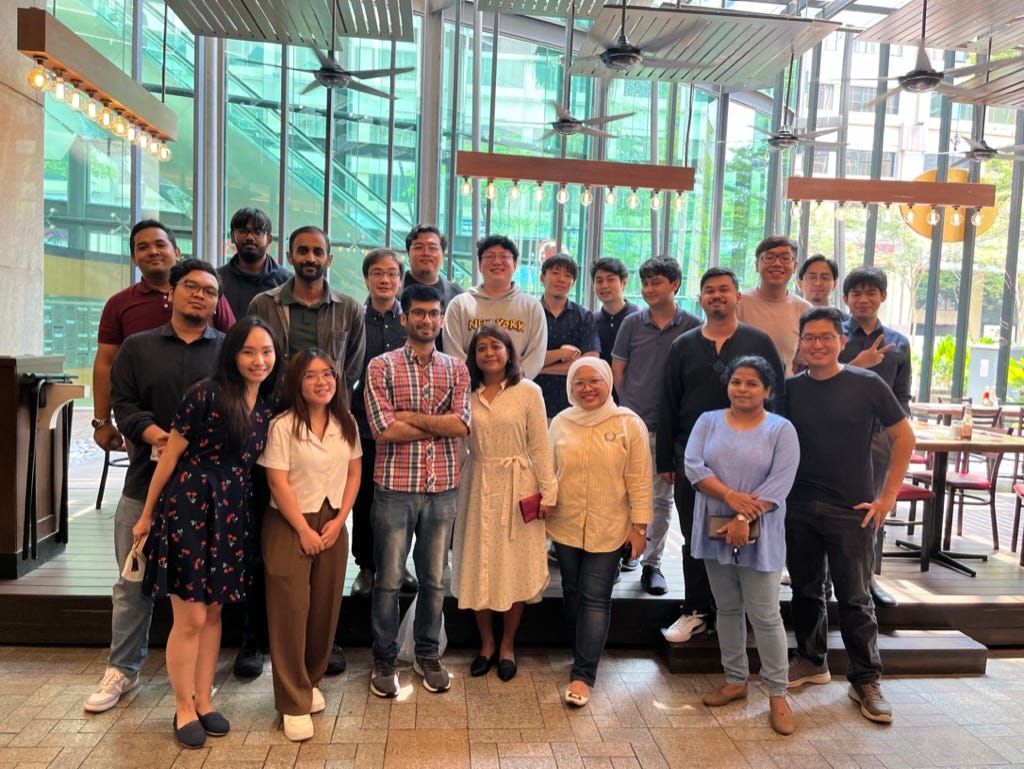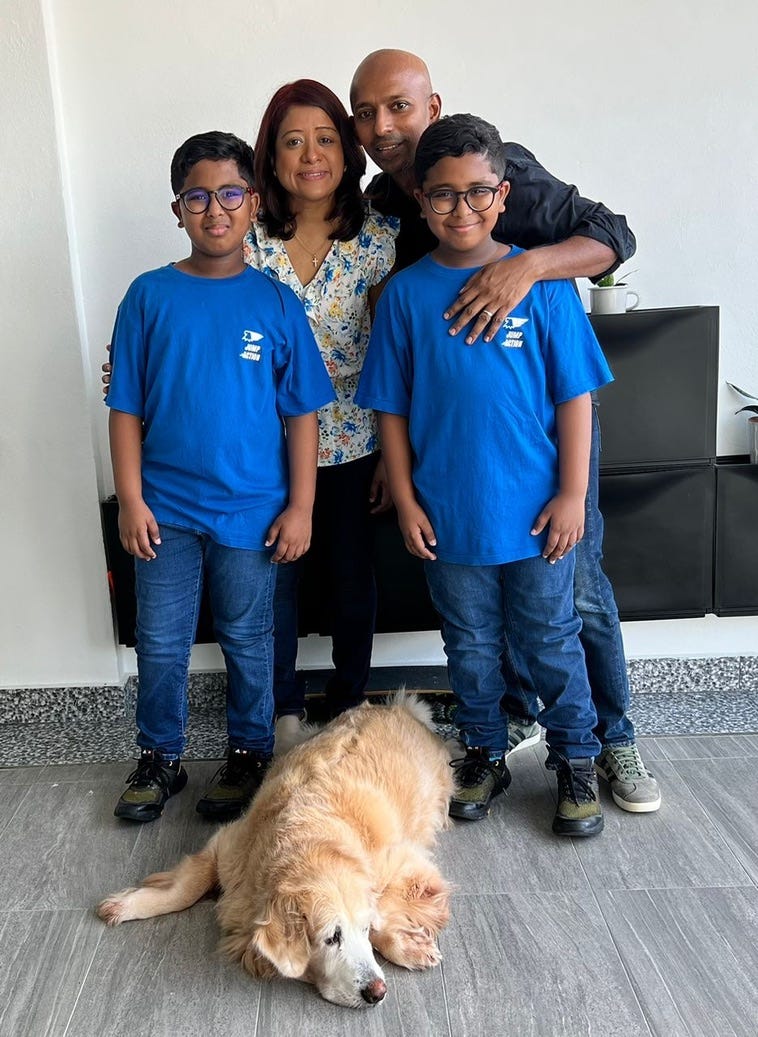Dear readers,
It's been a while since I last reached out, and I wanted to share why. Over the past year and a half, I’ve immersed myself in helping a dear friend with her business venture. We had initially met in a professional setting, stayed in touch over the years, and naturally reconnected when the opportunity arose to collaborate. This experience has been profoundly rewarding, reinforcing the importance of networking and relationship-building—both personally and professionally.

On a more personal note, our family also endured a significant loss. Ginger, our beloved canine companion, passed away shy of her 13th birthday. Guiding our children through this grieving process was emotionally challenging, especially because Ginger had been part of their lives from the day they were born. Amid this sorrow, we experienced the extraordinary love and support of friends, family, and community, reminding us of the strength that comes from meaningful relationships.

This period of reflection led me to recognise that, whether in personal or professional contexts, relationships act as the lifeline that sustains us through life’s challenges and opens doors of opportunity for new experiences. In times of hardship, we have two options: allow ourselves to be overwhelmed or accept the support of others to rise stronger and more resilient. Our bonds define how we weather storms, so nurturing authentic relationships is crucial.
I acknowledge that building and maintaining authentic connections has become increasingly complex in today's fast-paced, digital world. At the same time, it’s easier to find community and make new friends instantly. But, do we want to make time and invest in relationships that will spur us on to grow? Marcus Aurelius, in his Meditations, emphasizes the importance of understanding others. One of his key teachings is to remind yourself that people are part of a greater whole and their actions are often driven by their circumstances and internal struggles. He writes:
“When you are about to embark on a task, remind yourself what kind of person you are: someone who is a part of the universe, and is committed to acting in harmony with its laws. The universe’s laws include the necessity for people to sometimes act poorly.”
This reminds us that understanding others’ actions—especially when they seem to harm or disappoint us—can help maintain calm, empathy, and perspective in our relationships. Building relationships, especially close ones, requires us to consider the perspective of others, knowing that their behavior might not always align with our expectations but is shaped by forces beyond their control.
Whether it’s deepening friendships, navigating romantic relationships, or fostering professional networks, what should we weigh in on?
The Subtle Art of Influence
Robert Greene’s The Art of Seduction and The 48 Laws of Power touch on the art of influence, manipulation, and power dynamics, but also about creating genuine, lasting connections with others. He emphasizes one critical law:
“Master the art of timing.”
In relationships, timing can make or break a bond. Being attuned to the right moments to connect or take a step back can enhance the depth of your interactions. In both personal and professional relationships, understanding the right moment to listen, offer support, or give someone space can foster mutual respect and trust.
The Importance of Resilience and Perspective (Ryan Holiday)
Ryan Holiday, in The Obstacle is the Way and Ego is the Enemy, draws on Stoic philosophy to highlight how obstacles, conflict, and setbacks are not roadblocks but opportunities for growth. He writes:
“The impediment to action advances action. What stands in the way becomes the way.”
In relationships, we often face conflicts, misunderstandings, or even betrayals. Instead of seeing them as the end of the relationship, Holiday’s perspective encourages us to embrace these moments as opportunities to grow, both individually and within the relationship. By developing resilience, we can turn challenges into moments of deeper understanding and stronger bonds.
Virtue and the Role of Integrity (Aristotle)
Aristotle’s Nicomachean Ethics talks about the importance of virtue in human life. He argues that living a life of integrity—one in which we are honest, just, and kind—leads to flourishing relationships. For Aristotle, virtue isn't about acting in a perfect way, but rather consistently striving toward what is good. He says:
"The good for man is an activity of the soul in accordance with virtue, in a complete life."
When we consistently show up as virtuous, we build trust and respect in relationships. People are naturally drawn to those who are authentic, dependable, and have a clear sense of moral grounding. Integrity is a cornerstone of any successful relationship.
The Role of Control and Letting Go (Epictetus)
Epictetus, a Stoic philosopher, emphasizes the importance of controlling what is within our power and letting go of what is not. In relationships, we often try to control others’ behaviors, outcomes, or even how things unfold, but Epictetus would urge us to focus only on what we can control—our responses, actions, and attitudes.
“We cannot choose our external circumstances, but we can always choose how we respond to them.”
By focusing on our own reactions and letting go of the need to control the people around us, we can free ourselves from unnecessary tension and allow relationships to grow naturally. This is essential for building a strong foundation based on trust and acceptance.
The hard truth is, relationship-building is a skill but also one that can be cultivated through intentional effort.
Relationships are a Lifelong Journey
Building strong relationships doesn’t happen overnight—it’s a journey of continuous learning, intentional effort, and mutual care. By mastering the art of timing, being resilient and shifting our personal perspectives, being virtuous in our speech and actions, learning to let go of the things that are not in our control are but just some actionable steps we can take to cultivate relationships that enrich our life.
If you’d like to explore personalized strategies for deepening your connections, I’d love to support you on your journey. Reach out for a free coaching consultation, and together, we’ll develop a plan tailored to your unique goals.
If this newsletter was forwarded to you, I hope it has been a read that was worth your time. Also, here is a chance for you to subscribe at no cost to this monthly newsletter.

Here’s to building deeper, more fulfilling relationships—one meaningful and mindful conversation at a time.




So good to hear from you again through this channel. Thank you for the reminder that relationships matter and it is something worth pursuing.